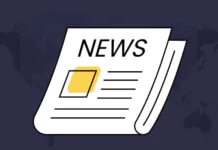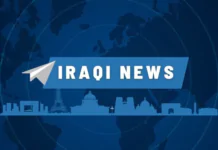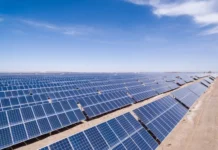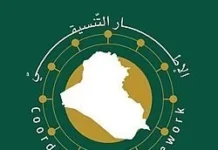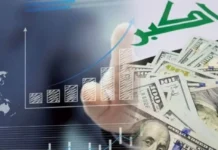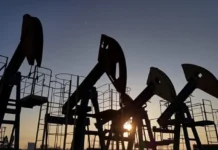Oil Prices Stabilize, Brent At $61
Time: 2025/05/01 07:52:31 Read: 2,235 times {Economic: Al Furat News} Oil prices stabilized with little change after recording their largest monthly decline since 2021, amid indications that the OPEC+ alliance may be entering an extended phase of increased production.
West Texas Intermediate crude traded around $58 a barrel after falling 3.7% on Wednesday, while Brent crude held near $61.
Reuters reported that Saudi officials have told their allies and industry experts that the kingdom can withstand lower prices for an extended period.
At its meeting earlier this month, the OPEC+ alliance decided to raise oil production by more than previously estimated starting in May, by about 411,000 barrels per day, equivalent to three months of planned increases.
This report comes as the market awaits OPEC+’s next move, given the recent decline in oil prices. JPMorgan analysts led by Natasha Kaneva see in a note a “growing likelihood” that OPEC+ will accelerate the return of crude supplies to the market at its next meeting on May 5.
Meanwhile, hopes for a quick breakthrough in US-led trade negotiations are fading, negatively impacting the outlook for energy demand.
US economic contraction: Oil prices have been under pressure since US President Donald Trump announced on April 2 that he would impose high tariffs, heralding a broader trade war that could lead to a global economic slowdown.
Data on Wednesday showed that the US economy contracted for the first time since 2022, while manufacturing activity in China fell to its worst level since December 2023. This decline overshadowed more positive data showing a decline in US oil and gasoline inventories last week.
According to Morgan Stanley, global oil demand in April remained unchanged from last year’s level, at 102 million barrels per day, although the bank had expected an increase of 500,000 barrels per day over the previous month. LINK
The Central Bank Of Iraq Has Decided To Sell $2,000 To Each Pilgrim At The Official Exchange Rate.
Thursday, May 1, 2025 17:25 | Economic Number of readings: 143
https://ninanews.com/Uploads/Images/2025/5/1224130-1e78f8df-f682-48ba-bc0c-f316aec7bc8b.jpg
Baghdad/ NINA / The Central Bank of Iraq decided, on Thursday, to sell $2,000 to each pilgrim at the official exchange rate of 1,320 per dollar.
The text of the document issued by the Central Bank stated that it was decided to grant each pilgrim $2,000 at the official rate,
as part of the facilities provided to pilgrims to the House of God https://ninanews.com/Website/News/Details?key=1224130
Terms And Conditions
April 30, 2025 Anti-Money Laundering and Counter-Terrorism Financing Controls for Electronic Payment Service Providers. For more information, click here https://cbi.iq/static/uploads/up/file-174600330029591.pdf
[48 page pdf file in Arabic] https://cbi.iq/news/view/2878
A UN Assessment Of Iraq’s Position On Regional Crises And Its Dissociation From Them
Time: 2025/05/01 22:01:51 Reading: 765 times {Local: Al Furat News} The United Nations praised Iraq’s stance on regional crises and its dissociation from them on Thursday.
The Special Representative of the Secretary-General for Iraq, Mohammed Al-Hassan, said in a press statement that: “The Iraqi government’s handling of the region’s crises has been extremely successful.”
He added, “The government has kept many disputes and conflicts away from Iraq,” noting that “Baghdad and Erbil have dealt calmly and professionally with the region’s challenges to protect Iraq from any negative impacts.”
Al-Hassan explained that “the Iraqi authorities and decision-makers have dealt in an optimal and rational manner, keeping the country away from many problems.” LINK
Parliamentary Finance: Budget Tables Will Reach Parliament After The Legislative Recess.
Thursday, May 1, 2025, 4:03 PM | Economics Number of reads: 316 Baghdad / NINA / The head of the Parliamentary Finance Committee, Atwan Al-Atwani, announced that the budget tables will reach the parliament after the legislative recess.
Al-Atwani said, “Voting on the budget tables within the parliament will not exceed the ninth of next June due to the legislative recess,” noting that “the budget is approximately 210 trillion, divided into an operating budget of approximately 155 trillion and a 55 trillion investment budget with a deficit of 66 trillion dinars.”
He added, “Our planned path for discussing the budget and studying these tables is to review their contents and study them in detail,” noting that “the first ministers to attend to discuss the budget will be the Minister of Finance, followed by the Minister of Planning.”
Al-Atwani continued, “The approved mechanism for distributing the investment budget amounts, whether between ministries or governorates, is studied and analyzed, after which the report is written and submitted to the House of Representatives, and then the budget tables are presented with the report to the House for voting on them.
” He stressed “the committee’s keenness to complete the task as soon as possible, considering that we voted on a three-year budget for the government to operate comfortably and not to disrupt the tables.” https://ninanews.com/Website/News/Details?key=1224120
The Iraqi Banking Sector Between Support Flexibility And The Risk Of Reserve Depletion: A Reading Of The Fitch Report And Central Bank Figures
Economy News – Baghdad Bassam Raad / Economic Researcher At a time when Fitch Ratings confirms the flexibility of the Iraqi banking sector in the face of oil price fluctuations (1), the Central Bank’s figures reveal a decline in foreign reserves during the first quarter of 2025 (Al-Marsoumi) (2).
These two reports present a multifaceted picture of the Iraqi economy, highlighting short-term resilience thanks to liquidity support policies and long-term risks associated with reliance on oil, price volatility, and declining foreign reserves.
The Fitch report indicated that the Iraqi banking sector, despite its low credit rating (CCC)(3), is not directly affected by the decline in oil prices.
This is due to the Central Bank’s ability to support government spending through proactive monetary policies. One of the most prominent of these policies is known as monetary sterilization(4), through which the exchange rate is maintained stable and inflation is curbed.
Central Bank figures also revealed that Iraq’s foreign exchange reserves declined by more than $7 billion during the first quarter of 2025, reaching 127.198 trillion dinars in March 2025, compared to 136.877 trillion dinars in December 2024. This means that the Central Bank sacrificed a portion of its reserves to achieve domestic financial stability, reinforcing Fitch’s claim about the resilience of the banking sector.
Overall, the Fitch report cannot be separated from the decline in oil prices, which fell from around $77.3 to $72 per barrel during the first quarter of this year, a source of approximately 90% of Iraq’s revenues.
While the agency saw that the direct impact on banks is limited, we can sense the indirect impact through the Central Bank’s figures and through
The Following Comparison:
Government revenues declined, increasing pressure on the central bank.
Foreign exchange reserves: decreased by approximately 9.679 trillion dinars by the end of the first quarter of this year.
Here, the data shows that support policies may achieve temporary stability, but they rely on limited resources (foreign reserves), which portends risks if oil prices continue to decline or government spending expands unplanned.
Despite the Central Bank’s assurances that reserves are still good by international standards (their ratio to the money supply is above 20%) (5), in an oil-dependent country like Iraq, the decline in oil revenues negatively affects foreign currency flows. The continued decline in oil prices for a long period may weaken the ability to compensate for depleted foreign reserves.
The most important message conveyed by Fitch’s reports and the central bank’s figures is that “temporary stability is no substitute for radical reform.”
While monetary support policies demonstrate short-term resilience, depleting reserves and rising public debt portend future crises if the Iraqi government does not rapidly diversify its economy and adopt radical reforms.
Iraq is at a crossroads: either diversify its sources of revenue and move toward a productive economy based on industry, technology, and agriculture, or remain hostage to the volatility of oil prices and the fragility of credit ratings. https://economy-news.net/content.php?id=55007
For current and reliable Iraqi news please visit: https://www.bondladyscorner.com/
